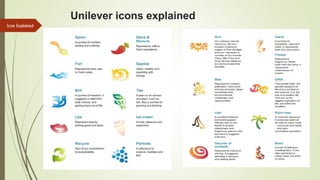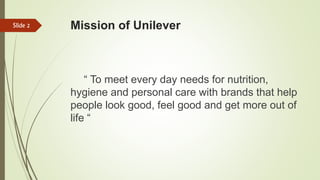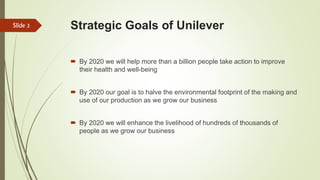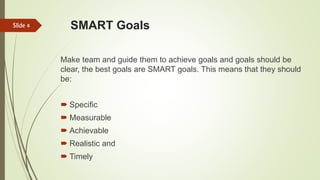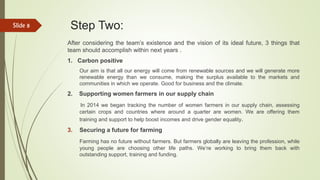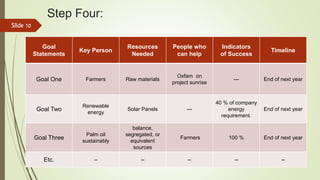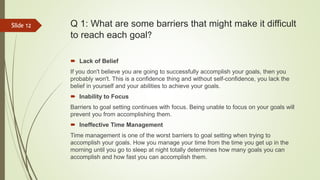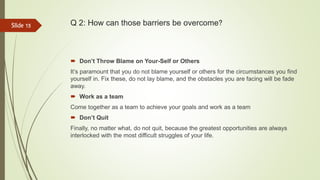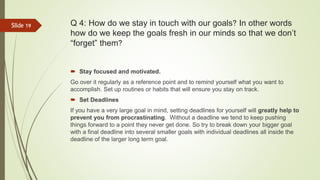Unilever presentation (1)
- 2. Organization
- 3. Unilever icons explained Icon Explained
- 4. Vision of Unilever “ Our vision to Double the size of our business, whilst Reducing our environmental footprint and Increasing our positive social impact ” Slide 1
- 5. Mission of Unilever “ To meet every day needs for nutrition, hygiene and personal care with brands that help people look good, feel good and get more out of life “ Slide 2
- 6. Strategic Goals of Unilever By 2020 we will help more than a billion people take action to improve their health and well-being By 2020 our goal is to halve the environmental footprint of the making and use of our production as we grow our business By 2020 we will enhance the livelihood of hundreds of thousands of people as we grow our business Slide 3
- 7. SMART Goals Make team and guide them to achieve goals and goals should be clear, the best goals are SMART goals. This means that they should be: Specific Measurable Achievable Realistic and Timely Slide 4
- 8. Step One: No matter how large or small your team is, they will gain purpose from knowing the answer to these 2 questions: 1. Why do we exist ? 2. What does the organization want from us ? It is very important to realize them that why they are here and why they were formed as a team so that they can work more efficiently and effectively and answer is that: “We have to achieve goals which were assigned by our organization that’s way we exist” For example: The Walt Disney Company’s mission statement is, “To make people happy.” That’s why they exist. Slide 5
- 9. Step One: Once the question of existence has been answered, describe them scenario that what this team would accomplish – our ideal future ? “ A team of top-level management members was formed to create three organizational objective for the year and then pass them down to the department supervisors, who then pass them down to their management direct reports who then pass them down to their staff and team have to achieve goals as mentioned on Unilever vision” 1. Double the size of our business 2. Reducing our environmental footprint and 3. Increasing our positive social impact Slide 6
- 10. Step One: Our Plan is helping to drive profitable growth, reduce costs and fuel innovation. Our Plan is distinctive in three ways: It spans our entire portfolio of brands and all countries in which we sell our products. It has a social and economic dimension – our products make a difference to health and well-being and our business supports the livelihoods of many people. When it comes to the environment, we work across the whole value chain – from the sourcing of raw materials to our factories and the way consumers use our products. Slide 7
- 11. Step Two: After considering the team’s existence and the vision of its ideal future, 3 things that team should accomplish within next years . 1. Carbon positive Our aim is that all our energy will come from renewable sources and we will generate more renewable energy than we consume, making the surplus available to the markets and communities in which we operate. Good for business and the climate. 2. Supporting women farmers in our supply chain In 2014 we began tracking the number of women farmers in our supply chain, assessing certain crops and countries where around a quarter are women. We are offering them training and support to help boost incomes and drive gender equality. 3. Securing a future for farming Farming has no future without farmers. But farmers globally are leaving the profession, while young people are choosing other life paths. We’re working to bring them back with outstanding support, training and funding. Slide 8
- 12. Step Three: This is most important step which is testing you goals, where you have to test you mentioned goals against SMART criteria: Are your goals S - Specific M - Measurable A - Achievable R - Realistic and T - Timely Slide 9
- 13. Step Four: Goal Statements Key Person Resources Needed People who can help Indicators of Success Timeline Goal One Farmers Raw materials Oxfam on project sunrise --- End of next year Goal Two Renewable energy Solar Panels --- 40 % of company energy requirement. End of next year Goal Three Palm oil sustainably balance, segregated, or equivalent sources Farmers 100 % End of next year Etc. -- -- -- -- -- Slide 10
- 14. Step Five: Follow-up discussion questions: 1. What are some barriers that might make it difficult to reach each goal ? 2. How can those barriers be overcome? 3. What are some things that you can do individually to help achieve the team goals? 4. How do we stay in touch with our goals? In other words how do we keep the goals fresh in our minds so that we don’t “forget” them? 5. How can we make reaching our goals more efficient? Enjoyable? Slide 11
- 15. Q 1: What are some barriers that might make it difficult to reach each goal? Lack of Belief If you don't believe you are going to successfully accomplish your goals, then you probably won't. This is a confidence thing and without self-confidence, you lack the belief in yourself and your abilities to achieve your goals. Inability to Focus Barriers to goal setting continues with focus. Being unable to focus on your goals will prevent you from accomplishing them. Ineffective Time Management Time management is one of the worst barriers to goal setting when trying to accomplish your goals. How you manage your time from the time you get up in the morning until you go to sleep at night totally determines how many goals you can accomplish and how fast you can accomplish them. Slide 12
- 16. Q 1: What are some barriers that might make it difficult to reach each goal? Uncertainty You must know what you want before you can set or achieve a goal. If you are not certain what you want, how can you even start to set a goal to get what you don't know is out there. Lack of Proper Planning Planning plays important role in any goals , lack of proper planning is the biggest barrier to reach any goals, so do proper planning of goals and goals also should set against SMART criteria Slide 13
- 17. Q 2: How can those barriers be overcome? Experiment in New Directions Use this gathered information to try new things and move in new directions that you never considered before. Accept and Acknowledge Circumstances We must therefore accept and acknowledge the circumstances and should work as team to resolve those issues Think Critically and Creatively You must think creatively on critical situation Take Small Steps By taking small steps you ensure that you always remain in control and do not get overwhelmed by circumstances. Slide 14
- 18. Q 2: How can those barriers be overcome? Don’t Throw Blame on Your-Self or Others It’s paramount that you do not blame yourself or others for the circumstances you find yourself in. Fix these, do not lay blame, and the obstacles you are facing will be fade away. Work as a team Come together as a team to achieve your goals and work as a team Don’t Quit Finally, no matter what, do not quit, because the greatest opportunities are always interlocked with the most difficult struggles of your life. Slide 15
- 19. Q 3: What are some things that you can do individually to help achieve the team goals? Communication with team It is easiest way to communicate with your team and remove those communication gaps which effect team goals Motivate your team Being a member of group you must have ability to motivate your group members and motivation help people to achieve goals more effectively Break it down Take the big project steps and break them down into definable tasks that you can get your hands around. By breaking the tasks down the work won't feel so daunting, you will find the interdependencies and you will be able to stay on track much more successfully. How do you eat an elephant? One bite at a time. Break down the overall project, and your individual steps into bite sized pieces. Slide 16
- 20. Q 3: What are some things that you can do individually to help achieve the team goals? Identify clear roles. Each person is an important piece in the overall project puzzle. Know your role and the roles of others. If you are a project leader, take the time to clarify these roles for everyone. If you aren't a leader, ask until you really understand how you can best contribute. Remove Barriers Finally, to drive execution you must make sure you facilitate your team by removing any barrier that stops your team from delivering. Slide 17
- 21. Q 4: How do we stay in touch with our goals? In other words how do we keep the goals fresh in our minds so that we don’t “forget” them? Reviewing Keep reviewing your goals after some period and measure them whether they going well or you need to work more on it Remind Yourself You should always make your goal a priority. Don’t let it get lost in the entire jumble that goes on every day. We forget things all the time, even important things. It happens to the best of us. But that’s why you have to keep fail-safe methods ready just in case you do slip. Try to make a written statement of your goal which you can see every day. A note on the calendar, or even just a sticky note that you keep on your mirror will go a long way and will greatly help to accomplish the ultimate goal. Slide 18
- 22. Q 4: How do we stay in touch with our goals? In other words how do we keep the goals fresh in our minds so that we don’t “forget” them? Stay focused and motivated. Go over it regularly as a reference point and to remind yourself what you want to accomplish. Set up routines or habits that will ensure you stay on track. Set Deadlines If you have a very large goal in mind, setting deadlines for yourself will greatly help to prevent you from procrastinating. Without a deadline we tend to keep pushing things forward to a point they never get done. So try to break down your bigger goal with a final deadline into several smaller goals with individual deadlines all inside the deadline of the larger long term goal. Slide 19
- 23. Q 5: How can we make reaching our goals more efficient? Enjoyable? It is one of most important Question and its answer depend on your Planning which is your base to achieve any goals. If your goal was planned against SMART criteria mean if your goals are Specific, Measurable, Attainable, Realistic and Timely then you can achieve your goals more efficient, keep things easy and clear and let you team member freely to communicate with you, let them help in critical situation, be friendly with them which make you goals enjoyable….. Slide 20
- 24. Thanks Presentation ends here…..



